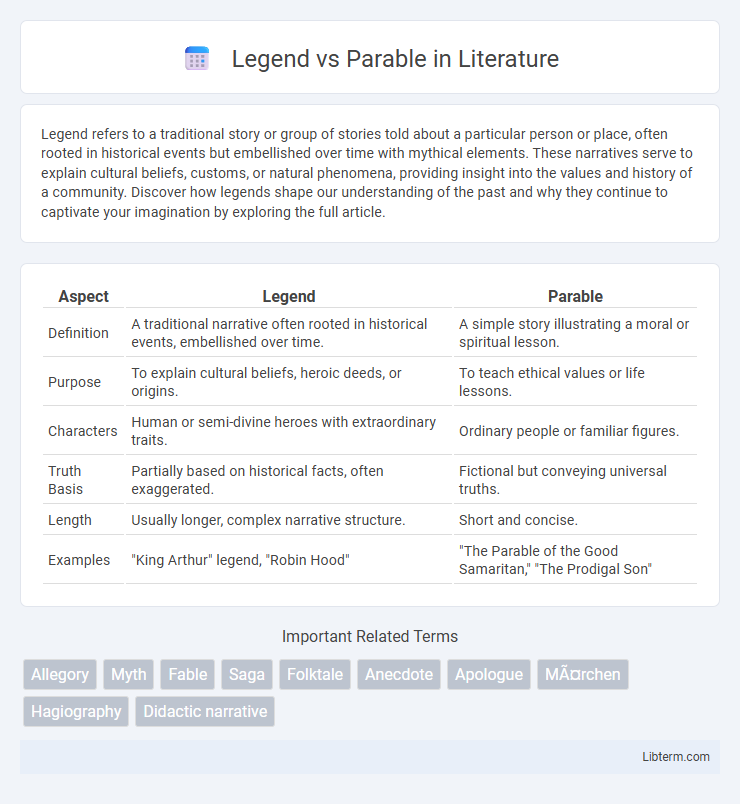Legend refers to a traditional story or group of stories told about a particular person or place, often rooted in historical events but embellished over time with mythical elements. These narratives serve to explain cultural beliefs, customs, or natural phenomena, providing insight into the values and history of a community. Discover how legends shape our understanding of the past and why they continue to captivate your imagination by exploring the full article.
Table of Comparison
| Aspect | Legend | Parable |
|---|---|---|
| Definition | A traditional narrative often rooted in historical events, embellished over time. | A simple story illustrating a moral or spiritual lesson. |
| Purpose | To explain cultural beliefs, heroic deeds, or origins. | To teach ethical values or life lessons. |
| Characters | Human or semi-divine heroes with extraordinary traits. | Ordinary people or familiar figures. |
| Truth Basis | Partially based on historical facts, often exaggerated. | Fictional but conveying universal truths. |
| Length | Usually longer, complex narrative structure. | Short and concise. |
| Examples | "King Arthur" legend, "Robin Hood" | "The Parable of the Good Samaritan," "The Prodigal Son" |
Defining Legends and Parables
Legends are traditional stories rooted in historical events, often featuring heroic characters and explaining cultural beliefs or natural phenomena. Parables are simple, allegorical tales designed to convey moral or spiritual lessons through symbolic narrative and characters. Both serve to transmit values and wisdom but differ in purpose and narrative style.
Historical Origins of Legends
Legends have historical origins rooted in cultural traditions and collective memory, often based on real events or figures embellished over time. These narratives serve to preserve historical facts while incorporating mythic elements that reflect societal values and beliefs. Unlike parables, which primarily function as moral or spiritual lessons, legends bridge history and folklore, providing insights into the historical contexts of ancient civilizations.
The Birth and Role of Parables
Parables originated as simple, memorable stories used by religious teachers, especially in the teachings of Jesus Christ, to convey moral and spiritual lessons through everyday situations. These narratives function as allegorical devices that encourage reflection and interpretation, often featuring human characters and relatable scenarios to illustrate abstract truths. Unlike legends, which blend historical facts and mythical elements to explain cultural origins or heroic deeds, parables prioritize direct ethical instruction and personal insight.
Core Elements of a Legend
Legends center around historical or quasi-historical figures and events, blending factual basis with imaginative embellishments. Core elements include a heroic protagonist, a setting linked to a specific time and place, and themes reflecting cultural values or moral lessons. These narratives often explain natural phenomena, customs, or origins, reinforcing community identity and shared beliefs.
Structure and Symbolism in Parables
Parables typically feature a simple narrative structure with relatable characters and everyday situations, designed to convey moral or spiritual lessons through symbolic meaning. Each element within a parable--from characters to settings--holds symbolic significance that invites interpretation beyond the literal story. In contrast, legends often focus on heroic deeds or cultural origins, emphasizing historical or mythical events with less overt symbolic encoding.
Purpose and Function in Society
Legends serve as vessels to preserve cultural history and heroic deeds, often blending truth with myth to inspire and unify communities. Parables function primarily as moral lessons, using simple narratives to convey ethical principles and guide individual behavior. Both forms shape societal values by reinforcing shared beliefs and norms through storytelling.
Key Differences: Legend vs Parable
Legends are traditional stories rooted in historical events or figures, often blending fact with fiction to explain cultural beliefs or origins. Parables are simple, didactic tales that convey moral or spiritual lessons through metaphorical narratives, commonly found in religious texts. The key difference lies in legends emphasizing historical or cultural context, while parables prioritize teaching ethical principles.
Famous Examples of Legends
Legends such as King Arthur and Robin Hood have endured through centuries as powerful narratives blending historical facts with mythical elements, illustrating heroism and cultural values. The tale of King Arthur embodies themes of chivalry and legendary kingship, while Robin Hood symbolizes resistance against oppression and social justice. These famous examples of legends continue to shape folklore by reflecting the ideals and struggles of their originating societies.
Notable Parables and Their Lessons
Notable parables such as the Prodigal Son, the Good Samaritan, and the Mustard Seed offer profound lessons on forgiveness, compassion, and faith's growth. The Prodigal Son teaches unconditional forgiveness and repentance, while the Good Samaritan emphasizes altruism beyond social boundaries. The Mustard Seed illustrates how small acts of faith can lead to significant spiritual growth, showcasing the enduring moral and ethical insights embedded in parables.
Enduring Impact on Culture and Morals
Legends and parables both shape culture and morals by embedding lessons within engaging narratives that resonate across generations. Legends often reflect historical or mythical figures, reinforcing cultural identity and shared values, while parables use simple, symbolic stories to convey ethical principles and provoke personal reflection. This enduring impact influences societal norms and moral frameworks, ensuring that communal wisdom is preserved and transmitted throughout time.
Legend Infographic

 libterm.com
libterm.com